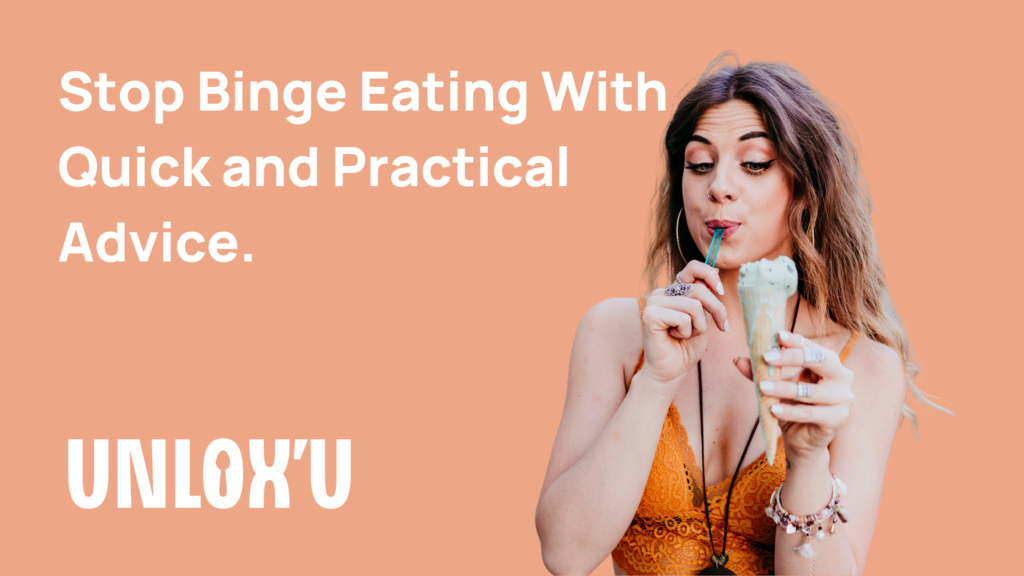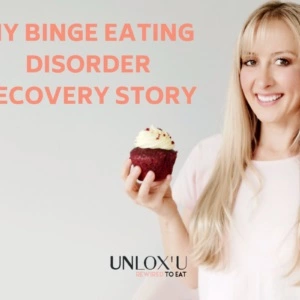How to stop binge eating – practical and quick advice.

Today, I wanted to share with you some quick but also practical suggestions on how to stop binge eating and some common challenges during binge eating recovery.
Overeating and snacking too much when recovering from binge eating
You have been doing well and feel like you have been recovering well, but you still have the odd binge eating episode. Maybe, you went to a party and snacked too much.
There will be occasional binge eating episodes and that’s very normal. When we consider how long we might have struggled with binge eating, we need to give ourselves grace with recovery. The brain is just used to using food to create comfort or distract ourselves from any form of discomfort.
Eating more at times is normal, it happens to all of us. It actually doesn’t mean anything other than that you ate more. It doesn’t mean you failed or that you go backwards or whatever other story you are telling yourself.
The difference is, though, that it no longer triggers further binges for you. You acknowledge that you ate more and move on with your life without continuing overeating and binge eating.
Once you understand the psychology behind binge eating and can address the exact cause for the specific urges that trigger your binges, you will feel in control of snacking, overeating and binge eating.
Doubting your success will continue?
This is actually such a common concern I hear from clients.
They start a program, start applying the tools and start noticing how well they are doing. However, they start noticing doubts it will continue that way because they did well in the past too. Why would it be different this time.
Doubts and fears of “failure” are actually very normal. It’s your brain trying to protect you from pain. It’s a survival instinct we have that has helped us to look out for the tiger in the bush. The survival brain focuses on what can go wrong so we won’t get hurt.
When you notice these thoughts of doubts come up, acknowledge your brain for keeping you safe and looking after you.
Also remind yourself that you have tools and strategies to apply and you are now taking care of keeping yourself safe.
Once we gain trust in ourselves, we can create consistency with healthy diet and our relationship with food in a much easier way.
How not to treat myself with food?
Treating ourselves is incredibly important. We work well with reward.
One of the reasons we binge, is because high palatable food stimulates the reward and please systems in the brain. We want to binge because it makes us feel good.
So, if we can create other ways to provide reward and pleasure, with time we create a new habit and binge eating will no longer be your primal way to make yourself feel good.
Some ways to reward yourself:
- Take time out to watch a show, read a book or just a magazine
- Book a relaxing and restorative yoga class to treat your body and your soul
- Meet with a friend for a walk or just a catch up
- Have you been wanting to buy some new clothes, maybe this is a good time
- Treat yourself to some luxurious self-care
No motivation to eat well even when I want to stop binge eating
Eating well does not always mean to have salads, chicken breasts and sweet potatoes.
It doesn’t need to be a certain way of eating or having very specific meals.
Sometimes, we just don’t want to cook and want a simple meal. Sometimes, all I have for dinner is yoghurt with some protein powder because that’s what I find appealing at the time. Other times, I want to have eggs on toast and feel satisfied.
Listen to your body and what it tells you.
If you are lacking motivation, what is truly going on for you?
Are you tired, overwhelmed, stress, worried?
What do you feel you truly need?
Looking after yourself and giving yourself adequate nutrition, doesn’t mean to eat perfectly or even getting it right. Just do your best to nourish yourself and also to look at the underlying reason for the lack of motivation.
Do you need to look after your mental health and well-being? Sometimes a day or two of rest is all we need to rejuvenate.
I still would not suggest to just give up and eat all the junk food because this won’t make it better long-term. If you feel like a treat, go for it, but remember having some poor quality food does not mean you have failed or you need to give up.
Often, our high expectations on ourselves is what hinders us from sticking to a healthy diet.
Night time eating and night time binge eating
Night-time eating can be quite common for many people. It can be a habit you have developed, it might be because you are trying to restrict calories during the day, it provides relaxation or it just gives you something to do.
To stop night-time snacking start asking yourself if you are eating regular meals and adequate amount of calories during the day.
If you find food at night-time is a way to relax, how about looking into other ways to relax that would give you some comfort?
It can be a cozy blanket with a heart-warming movie. Maybe you would enjoy lighting a candle, using some essential oils and writing how you feel and what you dream of in your journal? Have you been wanting to learn knitting or creating some crafts? This could be a great time.
Download this FREE night-time survival guide to learn about what is creating your night-time snacking and what you can do about it.
More help to stop binge eating:
If you want extra guidance as you learn to develop a healthy relationship with exercise, food, and weight, here are some resources for additional support:
Solve The Overeating Puzzle – Self-paced online program that gives you the exact pathway from beginning to end. A program that gives you all the information and answers you need as you end overeating, food cravings and binge eating.
13 KEY STEPS TO END BINGE EATING CYCLE
Regain power over food! Binge eating and emotional eating is not a food problem, it is an emotional problem. We can’t rely on willpower to stop binge eating. In this e-book, I am addressing the underlying reasons why we use food as a drug and what our body is trying to tell us.

Don’t know why you can’t stop eating?
Download the FREE guide to find out which of the 13 underlying triggers lead you to crave food, overeat or binge eat.



